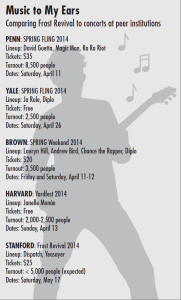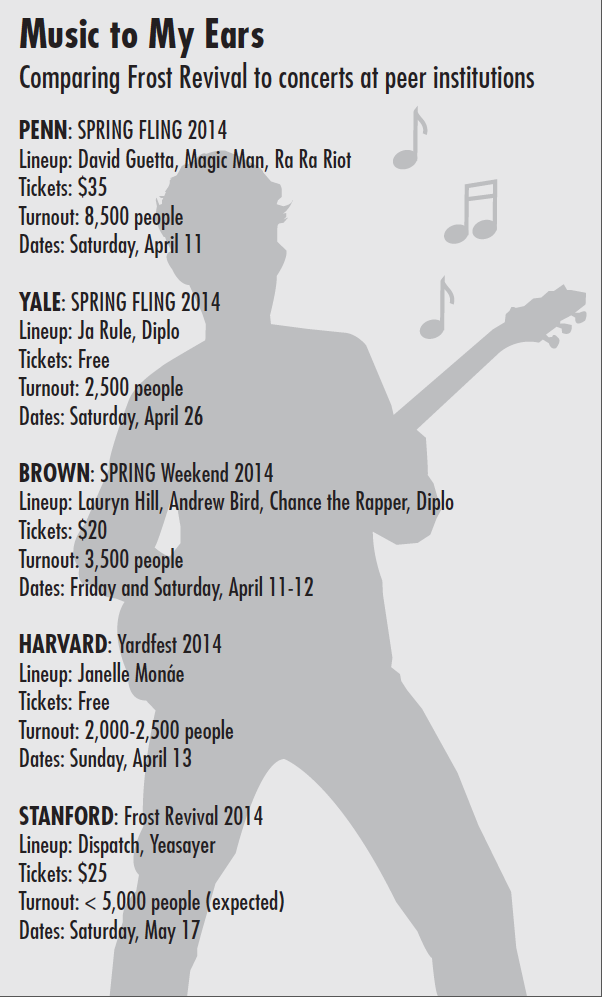This year Frost’s lineup of Dispatch and Yeasayer has prompted student disappointment and has also resulted in decreased ticket sales for the annual music and arts festival. As comparable universities on the East Coast score stars such as David Guetta, Lauryn Hill and Chance the Rapper for spring concerts, many Stanford students have questioned why Stanford is not bringing in the same level of talent.
Frances Ball ’15, director of the Stanford Concert Network (SCN), acknowledged that Dispatch is less popular than the type of band that the group had been hoping for.
“This year, one reason why we’re not selling as many tickets is because we compromised,” Ball said. “Instead of having a really big act, we had two medium acts, and I think people just don’t really know the names as well.”

Despite the lesser name recognition of Dispatch, Ball explained that the band still ranked high on a student-generated list of acts. SCN begins the selection process for Frost around November, when the group develops a list of roughly 50 bands that people like, work with an agent to narrow that list to 20 bands and send that out to student body. Based on the student data, SCN then starts going after the No. 1 band on the list.
However, SCN has struggled to get the top artists because many have turned down the offer due to a variety of reasons, including disinterest, unavailability and budget constraints.
“Generally the first few don’t work, and that kind of thing happened this year,” Ball said. “Dispatch was high on our list, but not one of the very top ones.”
Yale and the University of Pennsylvania have similar processes, but both schools begin by soliciting student input from the student body and then start whittling down the list based on artist availability and budget.
Budgets appear to be one of the largest determining factors of the spring concert lineups. SCN, a special fees group, is the primary financial backer of Frost; around two-thirds of the event’s budget is covered by SCN special fees. Ticket sales also fund a significant portion of the event, with additional support from sponsors such as the Office of Alcohol Policy and Education, the Arts Institute and the Graduate Student Council.
Penn’s spring concert is similarly funded through student activity fees. However, the event also charges significantly higher ticket prices to provide a larger budget. According to Ben Yang, the senior managing director of concerts at Penn, its 2014 Spring Fling sold out at 8,500 students, with undergraduate floor seats priced at $45 and stand seating priced at $35. Tickets for graduate students and guests were all priced at $70. For Stanford’s Frost, on the other hand, tickets cost $25 for students and $40 for non-Stanford students with an expected turnout of less than 5,000.
“We are utilizing ticket pricing to basically allocate ourselves a bigger budget,” Yang said. “That really makes a huge difference.”
Yale’s Spring Fling is also funded through the school’s student activities fee, but Yale does not charge students for tickets to the concert. In fact, unlike the concerts at Stanford and Penn, which draw substantial money from their ticket sales, Yale’s event operates solely with the money allocated from the school.
Further, the Yale student activity fee is $75, compared to Stanford’s $429 annual student activity fee — giving the spring concert a budget for talent that, according to Erica Leh, head of Yale’s Spring Fling Committee, is one third that of comparable universities.
Despite Spring Fling’s more limited funding, the organizers at Yale work to secure artists early, this year locking down headliner Chance the Rapper by the end of October.
“We try to work really quickly so we can essentially low ball artists who we think are going to become popular,” Leh said. “We had our entire lineup picked out in September…and then we release at the beginning of the second semester.”
Past headliners for Yale’s Spring Fling have included Macklemore, Matt and Kim, Passion Pit and T-Pain. This year, however, Yale faced unexpected difficulties when Chance canceled four days before the event due to a hospitalization for laryngitis, forcing the committee to scramble to get another artist, Ja Rule, within eight hours.
The funding for Harvard’s Yardfest, which featured Janelle Monae this April, comes from an endowment gift allocated to the school’s College Events Board. The mission of the board, according to member Jake Lynch, is to provide free events to undergraduates.
“I think Harvard sometimes can be a pretty isolated place, so whoever the donor was… decided that it was very important to have something that unified the campus — that no matter what the student’s background, they can enjoy,” Lynch said. “So for that reason, all of our concerts are free and accessible to everyone.”
Given the limitations presented, SCN is hoping to increase its budget for next year.
“We’re hoping [to] increase [the budget] a little bit next year because we got an increase in special fees and we want most of that to go towards Frost,” Ball said. “But we’re actually not getting as much increase as we hoped this year because ticket sales haven’t been as great as they were last year. The budget will probably be pretty similar.”
“The ideal would be eventually to have an act similar in size to last year, kind of like MGMT, a really big name, and then have another name as big as Dispatch,” she added. “But hopefully next year if we sell as many tickets as we’re hoping to this year and have an increase in special fees each year, it should get bigger over time.”
Contact Lucy Svoboda at lsvoboda ‘at’ stanford.edu.
